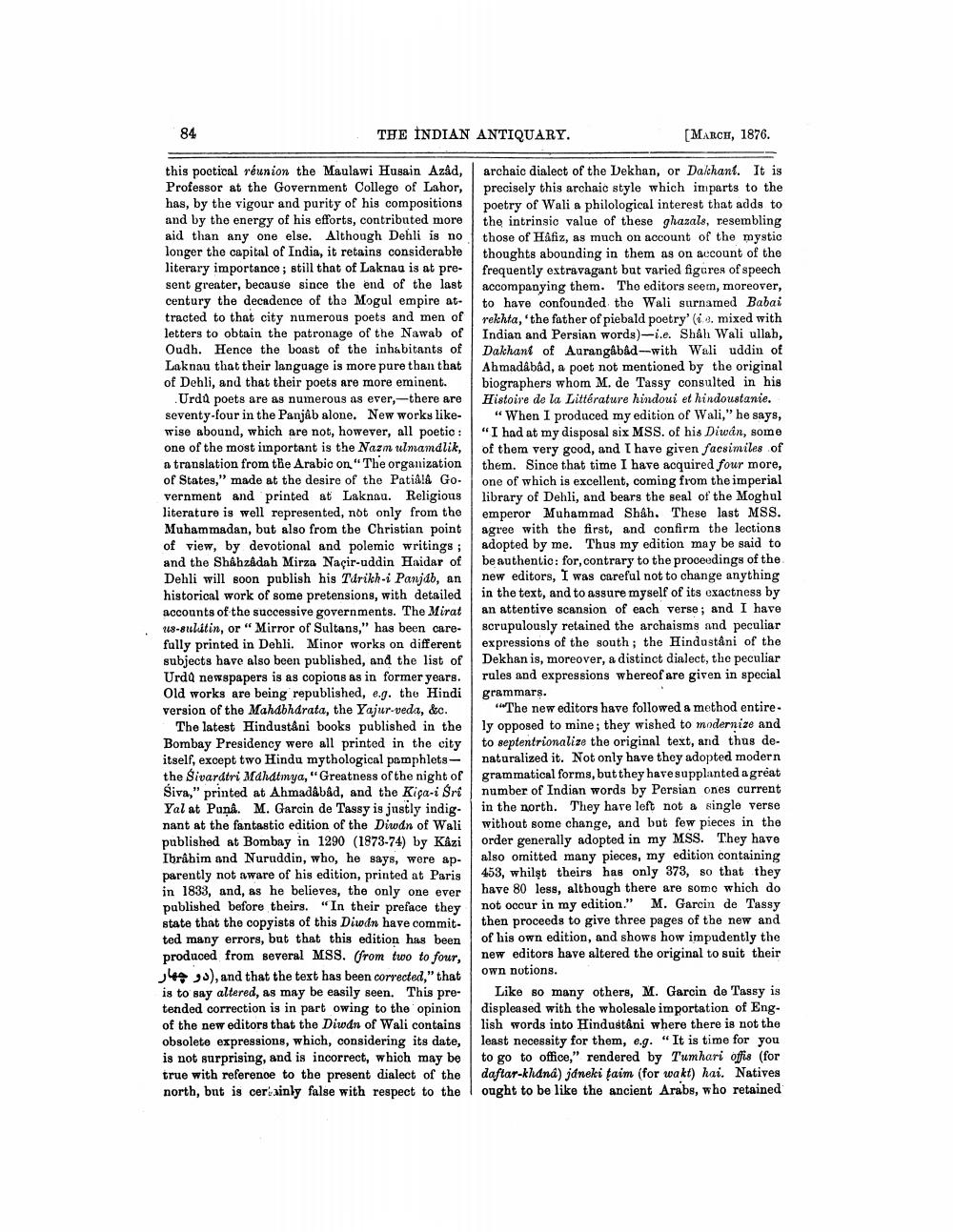________________
84
THE INDIAN ANTIQUARY.
[MARCH, 1876.
this poetical réunion the Maulawi Husain Azad, archaic dialect of the Dekhan, or Dalchant. It is Professor at the Government College of Lahor, precisely this archaic style which imparts to the has, by the vigour and purity of his compositions poetry of Wali a philological interest that adds to and by the energy of his efforts, contributed more the intrinsic value of these ghazals, resembling aid than any one else. Although Dehli is no those of Hafiz, as much on account of the mystic longer the capital of India, it retains considerable thoughts abounding in them as on account of the literary importance; still that of Laknau is at pre- frequently extravagant but varied figures of speech sent grenter, because since the end of the last accompanying them. The editors seem, moreover, century the decadence of the Mogul empire at. to have confounded the Wali surnamed Babai tracted to that city numerous poets and men of rekhta, 'the father of piebald poetry' i . mixed with letters to obtain the patronage of the Nawab of Indian and Persian words)-i.e. Shah Wali ullah, Oudh. Hence the boast of the inhabitants of Dakhant of Aurangabad -with Wali uddin of Loknau that their language is more pure than that Ahmadabad, a poet not mentioned by the original of Dehli, and that their poets are more eminent. I biographers whom M. de Tassy consulted in his
Urdu poets are as numerous as ever,--there are Histoire de la Littérature hindoui et hindoustanie. seventy-four in the Panjab alone. New works like- "When I produced my edition of Wali," he says, wise abound, which are not, however, all poetio : "I had at my disposal six MSS. of his Diwan, some one of the most important is the Nazm ulmamdlik, of them very good, and I have given facsimiles of
translation from the Arabic on." The organization them. Since that time I have acquired four more, of States," made at the desire of the Patiala Go. one of which is excellent, coming from the imperial vernment and printed at Laknau. Religious library of Dehli, and bears the seal of the Moghul literature is well represented, not only from the emperor Muhammad Shah. These last MSS. Muhammadan, but also from the Christian point agree with the first, and confirm the lections of view, by devotional and polemic writings; adopted by me. Thug my edition may be said to and the Shahzadah Mirza Naçir-uddin Haidar of be authentic: for, contrary to the proceedings of the Dehli will soon publish his Tarikh-i Panjáb, an new editors, I was careful not to change anything historical work of some pretensions, with detailed in the text, and to assure myself of its exactness by accounts of the successive governments. The Mirat an attentive scansion of each verse; and I have 28-sulitin, or "Mirror of Sultans," has been care- scrupulously retained the archaisms and peculiar fully printed in Dehli. Minor works on different expressions of the south; the Hindustani of the subjects have also been published, and the list of Dekhan is, moreover, a distinct dialect, the peculiar Urdd newspapers is as copions as in former years. rules and expressions whereof are given in special Old works are being republished, e.g. the Hindi | grammars. version of the Mahabharata, the Yajur-veda, &c. "The new editors have followed a method entire
The latest Hindustani books published in the ly opposed to mine; they wished to modernize and Bombay Presidency were all printed in the city to septentrionalize the original text, and thus deitself, except two Hindu mythological pamphlets- naturalized it. Not only have they adopted modern the Sivardtri Mahatmya, "Greatness of the night of grammatical forms, but they have supplanted a great Siva," printed at Ahmadábåd, and the Kica-i Sri number of Indian words by Persian ones current Yal at Paņa. M. Garcin de Tassy is justly indig. in the north. They have left not a single verse nant at the fantastic edition of the Diwan of Wali without some change, and but few pieces in the published at Bombay in 1290 (1873-74) by Kazi order generally adopted in my MSS. They have Ibrahim and Nuruddin, who, he says, were ap- also omitted many pieces, my edition containing parently not aware of his edition, printed at Paris 453, whilst theirs has only 373, so that they in 1833, and, as he believes, the only one ever have 80 less, although there are somo which do pablished before theirs. "In their preface they not occur in my edition." M. Garcin de Tassy state that the copyists of this Diwan have commit- then proceeds to give three pages of the new and ted many errors, but that this edition has been of his own edition, and shows how impudently the produced from several MSS. (from two to four, new editors have altered the original to suit their 40 s), and that the text has been corrected," that
own notions. is to say altered, as may be easily seen. This pre- Like so many others, M. Garcin de Tassy is tended correction is in part owing to the opinion displeased with the wholesale importation of Eng. of the new editors that the Diwdn of Wali contains lish words into Hindustani where there is not the obsolete expressions, which, considering its date, least necessity for them, e.g. "It is time for you is not surprising, and is incorrect, which may be to go to office," rendered by Tumhari offis (for true with referenoe to the present dialect of the daftar-khana) jáneki taim (for wakt) hai. Natives north, but is certainly false with respect to the ought to be like the ancient Arabs, who retained




